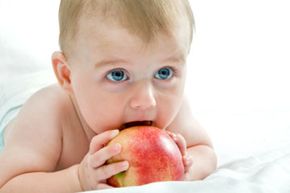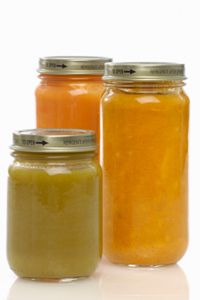Whether they're fed formula or breast milk, newborns need to eat every two to four hours, says Unger, who notes that even though formula tends to digest slower than breast milk, formula-fed babies should still fall within the two- to four-hour range. Breastfed babies may want to eat frequently — sometimes every hour — in the early weeks of life. That's tough news for exhausted parents who are aching to sleep through the night, acknowledges Dr. Tom Collins, a private practice pediatrician based in Concord, Mass., and founder of askdrtom.com.
Since there's no hard and fast rule as to when baby can go the entire night without eating, Collins takes his cue from baby: If baby is gaining weight appropriately in the first weeks of life, Collins might give the go-ahead for allowing baby to sleep as long as he wants at night. "If baby comes in at a week or two and is losing weight or has just gained a couple of ounces, I'm more direct about how frequently to feed the baby." Most experts don't recommend forcing baby to sleep through the night — in others words, not feeding him should he wake up — until baby is at least 4 months of age.
Babies' habits will vary widely by baby, but roughly 25 percent of babies will sleep through the night by 2 months, 50 percent will do so by 4 months and 75 percent will sleep through the night by 6 months, says Collins. "It just depends on when baby is ready. A baby can be 18 pounds and still waking up," he adds.
Helpful hint: Once baby has sipped from a bottle, it's not a good idea to reuse the milk or formula in the bottle, even if baby hasn't eaten much. The reason: baby's sucking introduces bacteria into the milk.
During the first four months of life, Unger and Collins recommend an entirely liquid diet — of either breast milk or formula. That means you shouldn't heed well-meaning friends' advice and slip baby cereal in his bottle in the hopes that he'll sleep longer. Baby isn't ready for cereal and, besides, there's no evidence that cereal actually helps keep baby's stomach full longer. "We want to go at baby's pace," says Collins. "He'll be ready for cereal when he can open his mouth, accept a spoon and be part of the meal," he says.
One exception to the milk-only rule: Breastfed babies can benefit from a vitamin supplement. "There is some new information that suggests that babies who are purely breastfed should also be on a vitamin D supplement," says Unger. "It's based on the fact that with the increased use of sunscreen babies are not getting as much vitamin D naturally." Your pediatrician can suggest an over-the-counter vitamin supplement.
While what to feed baby may be a no-brainer, how much to feed baby is not such a simple matter. Generally, newborns likely will polish off 1 to 3 ounces per feeding, and will graduate to 2 to 4 ounces as they get a little older, says Unger. By 4 months baby may suck down 6 to 8 ounces per feeding, says Collins. Keep in mind, however, that every baby is different and while you want to be careful not to underfeed baby, overfeeding baby shouldn't be a concern, unless baby is throwing up, says Unger. "Weight gain in the first four months of life is not related to obesity later on," she says. Therefore, it's probably safest to put a little more in baby's bottle than you think he will drink. That way, when he's ready to graduate to bigger feedings he'll have plenty to eat. Still, be alert for signs that baby has had enough: if he turns his head away or stops drinking, he may be trying to tell you something.
The bottom line in deciding how much to feed baby and how often he needs to eat: steer clear of rigid guidelines and instead look to your baby for clues. "I think parenting books are wonderful and great to keep you informed about what is happening to other babies, but they don't apply to one baby," says Collins. So read the books. Then put them away and let baby be your guide.
Helpful hint: Don't get into the habit of letting baby fall asleep with a bottle in his mouth — milk pools in the mouth and promotes tooth decay. Even if your little one is still toothless, you'll be starting a habit that is hard to break later.

